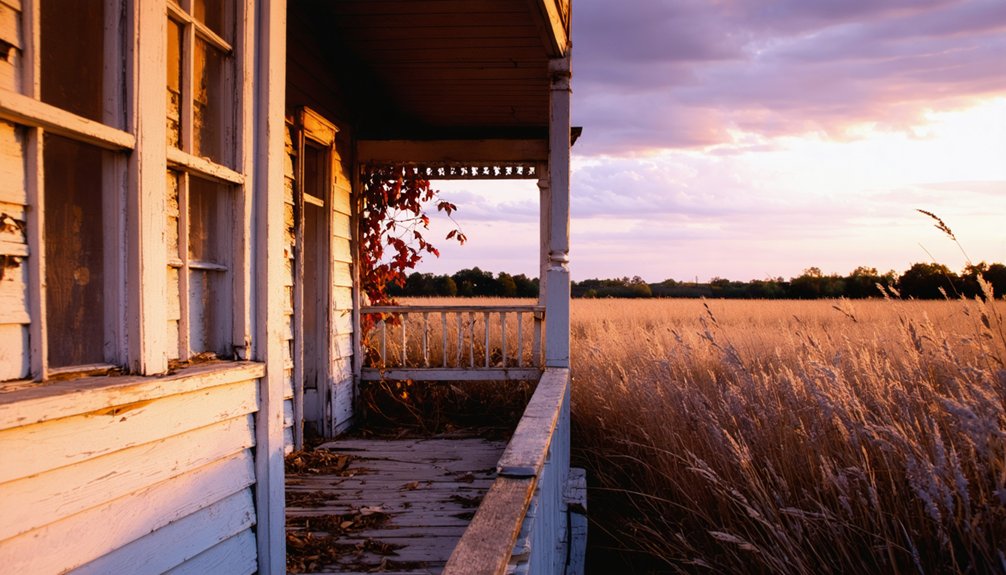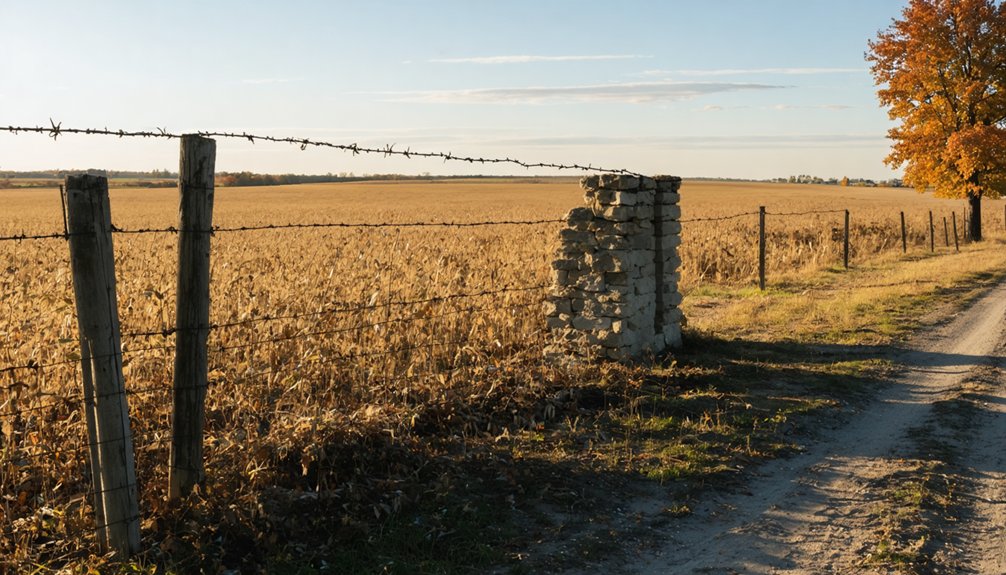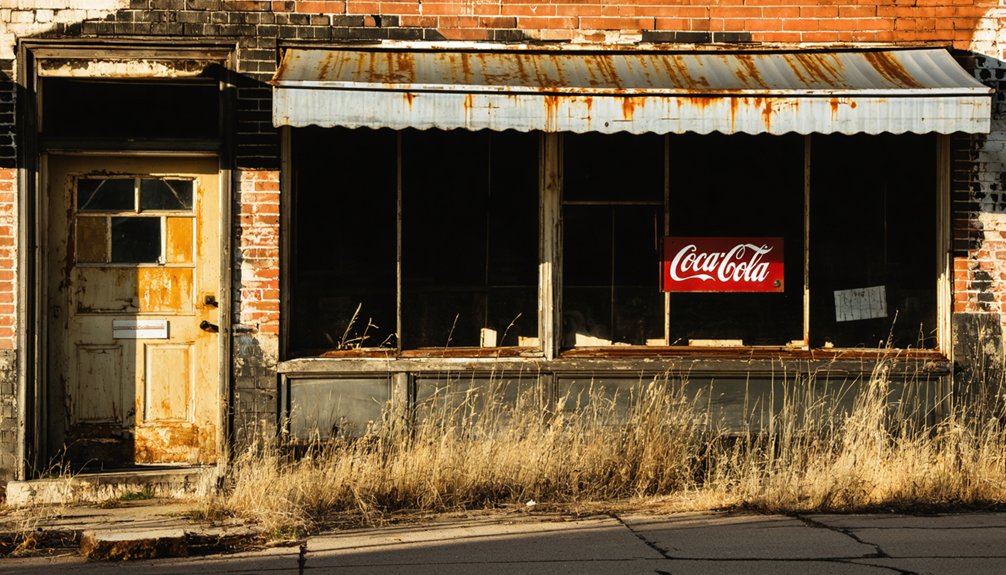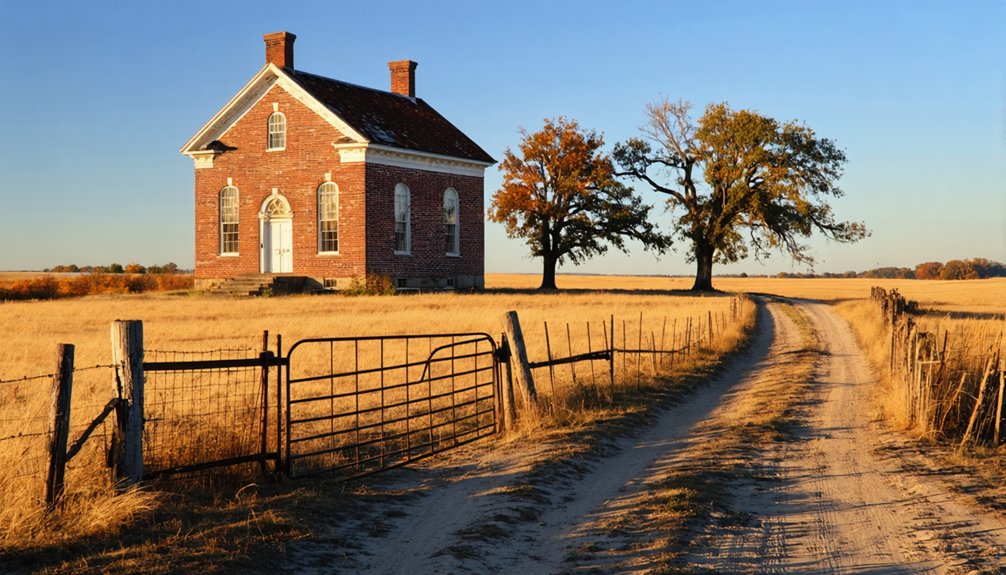You’ll discover Vishnu Springs as a fascinating 19th-century ghost town in Illinois, originally established as a health resort after Dr. A.W. Aiken recognized the mineral springs’ therapeutic properties in the 1840s. The resort reached its pinnacle under Darius Hicks’s ownership, with the Capitol Hotel opening in 1890 and attracting 3,000 annual visitors. Following tragic accidents, scandals, and prohibition-era crime, the once-bustling resort declined, though its haunting ruins and supernatural legends still captivate those who explore its history.
Key Takeaways
- Vishnu Springs was a Victorian health resort in Illinois, famous for its mineral springs and the Capitol Hotel built in 1890.
- The town reached its peak in the 1880s with up to 2,000 visitors seeking therapeutic benefits from the mineral waters.
- A fatal carousel accident in 1903, coupled with scandals and prohibition-era crime, led to the resort town’s steady decline.
- Local folklore includes ghost stories about Maud Hicks haunting the Capitol Hotel and a vengeful spirit from the carousel accident.
- Today, the abandoned town exists as the Ira & Reatha T. Post Wildlife Sanctuary, with only the Capitol Hotel remaining.
The Discovery of Healing Waters
While settlers in McDonough County had long recognized the mineral springs on Ebenezer Hicks’s land by the mid-1800s, it wasn’t until Dr. A.W. Aiken arrived that the waters’ true potential emerged.
Originally known as Tennessee Springs, Aiken strategically rebranded the location as Vishnu Springs in the 1840s, drawing inspiration from the Hindu god of preservation.
The name Vishnu Springs emerged from strategic marketing, as Dr. Aiken linked the healing waters to Hinduism’s divine preserver.
Recognizing the healing properties within these mineral springs, Aiken secured a lease from Hicks and began marketing the waters as a natural remedy.
You could purchase bottled spring water for 25 cents per gallon, with promises to cure everything from baldness to bladder inflammation.
The waters’ reputation for treating women’s diseases and stomach disorders spread rapidly, transforming this remote location into a sought-after destination for those seeking natural cures.
Large gatherings of 1,500 to 2,000 visitors would regularly attend camp meetings to sample the miraculous waters.
The success of the springs prompted Darius Hicks to construct a grand resort hotel after inheriting the property in 1889.
Birth of a Victorian Health Resort
After inheriting the springs property in 1889, Darius Hicks transformed the modest healing site into an ambitious Victorian health resort through meticulous planning and development. His vision materialized through a carefully surveyed town plan featuring three blocks, thirty residential lots, and a network of streets designed to complement the healing springs’ natural serenity. Plots were made available to interested buyers at thirty dollars each.
At the heart of the resort stood the magnificent Capitol Hotel, a showcase of Victorian architecture with its three stories, running water, and elevator-equipped ballroom. At its peak, the resort attracted 3,000 visitors yearly seeking therapeutic benefits from the springs.
You’d find an array of amenities including stores, a restaurant, and recreational facilities like a carousel and Lake Vishnu. The resort quickly attracted thousands of visitors seeking both spiritual renewal and physical healing, though its remote location maintained an air of exclusivity that appealed to Victorian sensibilities.
The Capitol Hotel’s Golden Era
When the Capitol Hotel opened its doors in May 1890, it represented the pinnacle of Victorian luxury in rural Illinois. The three-story structure, built for $2,500, boasted rare hotel amenities like running water and an elevator to its grand ballroom.
The Capitol Hotel embodied the height of 1890s elegance, bringing modern luxuries like elevators and running water to rural Illinois.
You’d find modern comforts alongside nature’s healing springs that drew up to 2,000 visitors seeking restoration.
Visitor activities flourished across the carefully planned grounds. You could spend your days enjoying the horse-powered carousel, fishing in Lake Vishnu, or participating in croquet matches on manicured lawns.
The resort’s social scene centered around horse races, while hammocks and picnic areas provided peaceful retreats. Local legends suggest that even Al Capone and bootleggers frequented the secluded property during Prohibition.
Two stores, a restaurant, and a blacksmith shop supported the thriving community until 1903, when a tragic carousel accident marked the beginning of the hotel’s gradual decline.
Daily Life in a Mineral Springs Town
Beyond the Capitol Hotel’s grandeur, everyday life in Vishnu Springs centered around the town’s defining natural resource. You’d find locals gathering at the mineral springs year-round, drawn to the naturally carbonated waters that flowed consistently regardless of weather or season.
The sulfurous springs served as both a practical water source and a social hub where you could exchange news and share in the perceived health benefits. Much like Colonel Clement’s spring that bubbled year-round on his plantation, these waters were a constant presence in daily life.
The surrounding landscape supported a largely agricultural way of life, with residents tending to farms and raising livestock on the spacious rural properties. Like modern-day Mineral Springs where large farms dominate the landscape, you’d see horses grazing in pastures, and local businesses like general stores and barbershops provided essential services.
Community gatherings often revolved around outdoor activities, while the springs’ therapeutic qualities attracted visitors seeking refreshment and healing in these natural waters.
Scandal, Crime, and Social Unrest
You’ll find that Vishnu Springs’ darkest chapter began with Darius Hicks’ scandalous marriage to his stepdaughter following his wife Maude’s death in childbirth.
The town’s remote location later attracted notorious bootleggers during Prohibition, with some accounts suggesting Al Capone himself used the area as a hideout. Darius Hicks’ eventual death by suicide in 1908 further cemented the town’s tragic reputation.
Violence and tragedy marked the resort’s decline, including a fatal carousel accident in 1903 that claimed a supervisor’s life and permanently closed the attraction.
Darius Hicks Family Drama
Although Vishnu Springs initially thrived under Darius Hicks’s ownership after 1889, a series of personal scandals and criminal incidents would ultimately contribute to the resort town’s downfall.
The family dynamics took a dramatic turn when Hicks’s wife Maude died during childbirth. In a shocking decision that shattered local sensibilities, Hicks married his stepdaughter, igniting a community scandal that would permanently damage his reputation. Much like the black market babies sold illegally during the 1950s and 1960s, this transgression represented a dark chapter in family ethics. His troubles culminated in a tragic end when he committed suicide by gunshot in 1908.
You’ll find that this controversial union forced the couple to flee Vishnu Springs amid public outrage. The resort’s decline accelerated as violent incidents, including fights and stabbings, began to plague the once-peaceful destination.
A tragic carousel accident that killed a visitor further stained the resort’s reputation, transforming its image from a healing sanctuary to a symbol of moral decay.
Bootleggers and Al Capone
During the Prohibition era of the 1920s, Vishnu Springs transformed from a fading resort into a notorious haven for bootleggers and criminals. The remote location and minimal law enforcement made it an ideal hideout for illegal alcohol production and distribution.
While bootlegger stories flourished, the most persistent tales involved Al Capone’s alleged visits to the springs. Despite the abundance of Capone myths in local folklore, no primary evidence exists to confirm his presence at Vishnu Springs.
However, the criminal activity had real consequences for the community. The resort’s reputation shifted from a healing retreat to a dangerous enclave, driving away legitimate visitors and permanent residents. Property values plummeted, and social unrest increased.
Violent Resort Incidents
Beyond the bootlegging era, Vishnu Springs faced a troubled history of violent incidents and moral scandals that eroded its once-peaceful reputation.
Resort violence erupted most prominently when a man named Ruddle attacked another visitor, Mourning, with a knife, inflicting a severe shoulder wound before fleeing authorities for weeks.
The property’s decline accelerated as criminal activities multiplied, including persistent vandalism, theft of hotel furnishings, and broken windows.
Darius Hicks’ personal scandals, including alleged affairs and controversies with his housekeeper, cast a shadow over the resort’s social standing.
By the 1970s, the property had devolved into an unauthorized commune occupied by Western Illinois University students, leading to frequent arrests for trespassing.
These compounding problems ultimately contributed to the resort’s abandonment and transformation into a ghost town.
From Bustling Resort to Abandoned Ruins
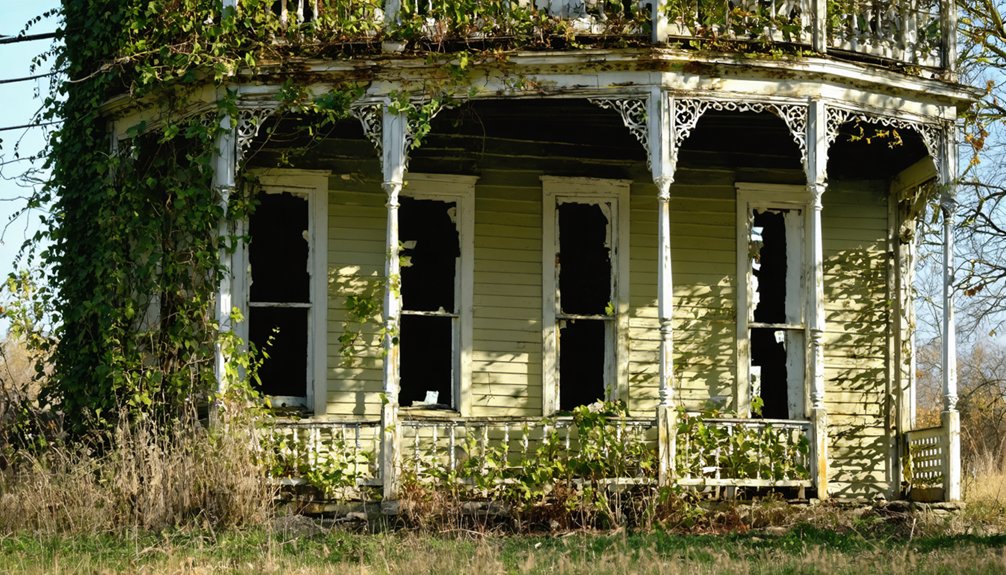
You’ll find that Vishnu Springs reached its zenith in the late 19th century as a health resort, complete with the imposing Capitol Hotel, recreational amenities, and a steady stream of visitors seeking the spring’s healing properties.
The town’s decline began in 1903 when a tragic carousel accident claimed a supervisor’s life, leading to the closure of key attractions and damaging the resort’s reputation.
Your understanding of this transformation deepens when you consider how subsequent scandals, criminal activity rumors, and seasonal isolation accelerated the resort’s downward spiral into abandonment by the 1920s.
Rise and Glory Days
The transformation of Vishnu Springs from untamed wilderness to bustling resort town began in the 1840s when the Ebenezer Hicks family first settled the land.
Under Dr. A.W. Aiken’s promotion, the spring’s reputation for healing properties drew thousands of visitors, leading to social gatherings of up to 2,000 people by the 1880s.
When Darius Hicks inherited the land in 1889, you’d have witnessed the town’s remarkable expansion, including:
- The majestic three-story Capitol Hotel rising above the landscape
- A vibrant commercial district with stores, restaurants, and a blacksmith shop
- Entertainment venues featuring a horse-drawn carousel, skating rink, and racetrack
The community thrived with nearly 30 homes, while the resort’s popularity peaked as visitors sought the spring water’s purported medicinal benefits.
Despite its wholesome reputation, the town also attracted colorful characters, including rumored visits from notorious gangsters.
Downward Spiral Begins
Despite its flourishing reputation in the late 1800s, Vishnu Springs’ descent into abandonment began with a series of tragic events in the early 1900s. A fatal carousel accident claimed a supervisor’s life, forcing the permanent closure of this popular attraction.
The community impact deepened when resort founder Darius Hicks faced personal tragedy – his wife Hattie’s death from Bright’s disease, followed by his controversial marriage to his stepdaughter Maud, who later died in childbirth.
Visitor decline accelerated as the town’s wholesome image crumbled. The resort’s isolation proved increasingly problematic, with barely passable roads limiting access, especially during winter months.
Horse-and-buggy transportation couldn’t sustain the necessary traffic flow. These challenges, combined with mounting scandals and the town’s inability to grow beyond 30 homes, marked the beginning of Vishnu Springs’ downward trajectory.
Legends and Supernatural Tales
Since its early days as a healing destination in the 1840s, Vishnu Springs developed a rich tapestry of supernatural folklore centered around its allegedly miraculous mineral springs.
The site’s mystique grew as visitors sought cures for various ailments, laying the foundation for ghostly apparitions and unexplained phenomena that would later haunt the grounds.
The most compelling supernatural tales include:
- The restless spirit of Maud Hicks, who died in childbirth, leaving mysterious “impressions” in her hotel room
- The vengeful ghost of a man crushed by the carousel, whose presence visitors still report sensing
- Shadowy figures spotted around the Capitol Hotel ruins, accompanied by unexplained noises and eerie sensations
The town’s dark history of bootlegging, scandal, and tragedy has only strengthened its reputation as a haunted destination, drawing curious explorers despite routine police patrols.
A Modern Wildlife Sanctuary
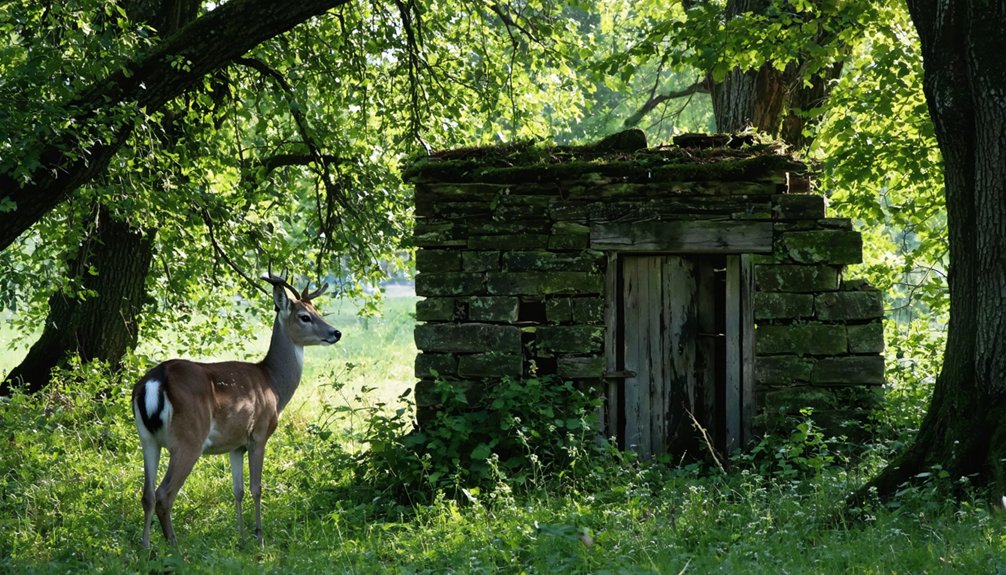
While Vishnu Springs’ mystical past continues to intrigue visitors, its modern incarnation serves an important scientific purpose as the Ira & Reatha T. Post Wildlife Sanctuary.
You’ll find this 160-acre property, owned by the Western Illinois University Foundation, has transformed from a bustling health resort into a crucial center for wildlife conservation and research.
Today, you can observe how nature reclaims disturbed ecosystems as university students conduct groundwater monitoring and biological assessments.
Though most original structures have vanished except for the weathered Capitol Hotel, the sanctuary offers rich educational opportunities across multiple disciplines.
Despite the loss of historic buildings, Vishnu Springs’ enduring Capitol Hotel anchors a vibrant living laboratory for diverse academic studies.
Through collaborative efforts between Western Illinois University and the Friends of Vishnu, you’re witnessing the preservation of both natural habitats and cultural heritage, ensuring this historic site continues to serve future generations.
Frequently Asked Questions
What Was the Exact Mineral Composition of Vishnu Springs’ Healing Waters?
You can’t determine the exact mineral composition since no detailed mineral analysis exists, though historical records mention salt content and healing properties claimed to cure various ailments in the 1880s.
How Much Did a Typical Stay at the Capitol Hotel Cost?
Like trying to find a deleted Instagram post, you won’t discover exact hotel pricing records. While visitors enjoyed affordable rural rates, the Capitol Hotel’s actual costs haven’t survived in historical documents.
What Happened to the Original Carousel After the Fatal Accident?
You’ll find no records of carousel restoration after the horrific 1903 accident. Following the supervisor’s death, the carousel was permanently shut down and likely dismantled, though its final fate remains undocumented.
Were There Any Documented Deaths Besides Maude Hicks and the Carousel Supervisor?
Two other confirmed deaths marked this town’s history: Darius Hicks died from a wound at 58, and his second wife Hattie Rush Hicks succumbed to Bright’s disease in 1896.
Can Visitors Currently Access Any of the Original Spring Water Sources?
You can’t directly access the original spring water sources, as they’re located on private or protected sanctuary land managed by Western Illinois University Foundation, with no maintained public access points.
References
- https://westernlivingjournal.com/vishnu-springs-from-healing-waters-to-a-colorful-tale-of-haunting/
- https://michaelkleen.com/2018/08/21/the-vishnu-springs-ghost-town/
- https://en.wikipedia.org/wiki/Vishnu_Springs
- https://www.pjstar.com/story/news/2009/10/25/vishnu-springs-new-life-in/42387334007/
- https://drloihjournal.blogspot.com/2022/08/lost-towns-of-illinois-vishnu-springs.html
- https://www.ghosthuntergirls.com/places/il/vishnusprings.html
- https://www.visitforgottonia.com/vishnu-springs/
- https://kids.kiddle.co/Vishnu_Springs
- https://www.cantonrep.com/story/news/2009/10/21/vishnu-springs-finds-new-life/45881597007/
- https://www.mcdonoughvoice.com/story/news/2010/10/14/a-chance-to-check-out/63504480007/
